#but like. if the story has not made you question at all Tony's meaningful degree of agency and the healthiness of the choices he makes with
Text
I know I wrote Blinding back in like 2013 but even to this day my villain origin story is when people comment that they're glad Tony has a happy ending in it
#it is an unreliable narrator dubious consent unhealthy relationship story from minute one#does Tony think he is choosing an ending that will make him happy? yes#but like. if the story has not made you question at all Tony's meaningful degree of agency and the healthiness of the choices he makes with#said agency? then the story didn't land quite right#blinding was meant to have a sequel called winter where even Tony's deeply unreliable close 3rd POV showed the cracks in the ending#but inspiration. time. major depression#etc. still. Blinding's ending should read as like happy (derogatory)#and I think the issue lies partially with my writing to be clear! I was not as strong a writer 10 years ago as I feel like I am now#(and will doubtless say the same thing in a decade about current me)#so like there are definitely parts of that story I would craft very differently if I was writing it now#I don't want to make it seem like I'm like 'oh people who read that story suck' bc that is not what I mean#I just mean like....Blinding is a work I'm still very proud of. many elements of it are cool. I did some things cleverly#which is partially why misreads on the ending are just like aghahbdjdn
2 notes
·
View notes
Link
J. August Richards has an exuberance about him.
He has good reason. The actor, known his more than 30 year career which has included roles on Agents of S.H.I.E.L.D., The Cosby Show, Angel, The Practice and more, just landed a leading role on the new NBC drama Circle of Dads. On April 20, he also rocked the internet by coming out of the closet as a gay man. The unplanned admission generated came in the context of discussing his Council of Dads role as Dr. Oliver Post, a gay, married African-American dad. The series follows a group of friends following the death of one of their friend Peter. Oliver, and several other men, come together to act as surrogate fathers to Peter’s children and to preserve the memory of their friend.
“I read your site every day!” Richards belts as we greet him on the phone. We warn him that we will need to use that quote in our piece. The two of us have made some time to chat about his coming out, the new show, and his experience as a queer, African-American working in Hollywood for more than three decades.
Council of Dads airs Thursdays on NBC.
So you’ve had an exciting few weeks. Exactly how are you feeling? What’s the state of your life?
Thank you for asking. Empowered.
Empowered?
Aligned. Clear about my purpose. That’s how I feel two weeks later. I will admit that I was on a bit of an emotional pendulum. In my imagination, there was a reaction that was the best reaction I could possibly get, which was supportive. But it exceeded that. Also I really did not expect it to go past my social media page. So that was a bit daunting. That was part of the emotional swing I was on.
Sure.
I had no idea that it would be picked up on various sites, which it was. And I didn’t even have a publicist at the time…
Oh my.
Yeah. So that’s how unplanned that was. I’ve hired one since because everything was going so far so fast that it was all a bit overwhelming. But when it went so viral, it made me feel like this emotional swing toward oh my God, why would you do that? No one even asked. That was the ultimate overshare. But fortunately, the pendulum has swung all the way back into the position of empowerment.
That’s so wonderful to hear. Now, when you describe it as an emotional pendulum, what are you doing as you walk around the house? How’s your mood shifting? What are you doing to take your mind off it all?
Yeah, it’s always surrounding a triggering question or triggering comment that I receive that really only triggered the fact that I was not expecting this attention. So that was the only thing that would scare me. It wasn’t negative at all. But, like, when people ask me, “Aren’t you afraid of how this will affect your career?” That question would really trigger me. I’ve obviously thought a lot about it. And that question doesn’t trigger me anymore.
I’ve talked to so many actors who have gone through a difficult coming out process and immediately have their agents or managers screaming “Why did you do that?” So it’s good to hear that it’s been so empowering.
I have a great agent. He’s been really supportive.
Now, you’ve said before that you’ve been out to people close to you for years. Have you had any blowback? People saying “why didn’t you tell me?”
No. Not one person. Anyone who needed to know, knew. And there were people who didn’t need to know that knew, just because they saw me out, or I went to a party. I’m living my life and doing whatever I want to do for the most part. People who know me, in my life, also know that’s not the kind of question I would entertain.
So let’s talk about your new show Council of Dads. Your role as Oliver, you’ve said, was part of what inspired you to go public. He’s a gay man married to another African-American man Peter, played by Kevin Daniels, and the couple has children. For you as an actor, what is it that speaks to you in a role where you realize it’s more than just a job? In other words, when the role changes you?
You know, honestly, it happens to me every single time.
Really?
Every single time, yeah. I think of it as my job to put something deeply personal to put on the line for myself. I have to find it, and I do with every role. This one is unique in that it pushed me up against a wall that I had created for myself. I think it served me when it had to. When I first started in the business, there were very few opportunities for a black actor.
Sure.
I jokingly say “I was too busy being black to be gay.”
But the industry has shifted enough to where there’s more LGBTQ representation and more black representation. And I just wasn’t mature enough as a human being to walk through life as a black gay man. Now, at 46, I have the confidence and the wisdom and the knowledge to be able to take it on. The reason I ended up talking about it publicly was that I saw a huge opportunity to be observant in a meaningful way, and I just could not pass it up. It was a very person decision. I wouldn’t be true to myself if I didn’t take the opportunity to continue a dialogue—it was started way before me. Black gay men, gay families—I would not have been happy with myself if I had not chosen to talk about it.
That speaks so well of you. One thing I really love about this show is the way it redefines community in a sense.
Yes.
There are right-wing voices that claim diversity is harmful, or focusing on it is harmful, that it’s all a myth. The series shows that community is defined by what is shared; in the case of the series, that’s a love for Scott Perry and his family. How do we encourage people to focus on what is shared, to accept one another?
Well, it oftentimes takes people knowing someone in a community, knowing someone that belongs to a community that is seen as “other” to break down that wall. Again, that goes back to the reason I decided to go public. The other great gift of coming out for me was that it made clear for me my true goal. I really want equality for all. I’m talking about groups that I belong to, and groups that I don’t belong to. Ultimately, we have to move toward a space where everyone can sit at the table equally. That’s one of the reasons I was so happy to be involved with this show. It has diversity, and it’s not cosmetic.
What do you mean by that?
It’s like there’s one of this and one of that. There are multiples of different in this world. As the season goes by, you’ll be able to understand even more what I mean by that. It really elevates the conversation about diversity in a way that I’m so proud of. You come home with Oliver & Peter. You come home with us, and a whole episode takes place in our house. So the other thing that attracted me to the show was that I’m not playing the “insert black gay guy here.” He’s a three-dimensional character. He’s not just the best friend. He has his own storyline. The character is not additionally marginalized by not giving him a full story.
I also love the way the show redefines masculinity.
Oooh! Mmhmm!
We have a trope in Western entertainment that fathers are either lovable buffoons like Homer Simpson or wisdom sages like Fred McMurray in My Three Sons. Either way, they are centers of authority and power. This show is different in that it shows men working together, sharing power, listening, conversing and making choices. It’s in the title: a council of dads. It’s not dictatorial patriarchy. Is that by conscious design, that Joan and Tony [series creators Joan Rater & Tony Phelan] had intended as much? Have you discussed it?
We’ve not talked about it, but I will say this: in developing the character one thing that you do as an actor is figure out the character’s super-objective.
Yes.
That means the one thing they want more than anything in life. It took me a while—call me slow—but I realized that what is important to Oliver is that he be a great father. That is the most important thing in his life. So I started to think about what makes a great father. I think the answer is different for each person depending on their father. So I think about Oliver’s past, and how his father did not accept him for who he was. He grew up in a household where he felt like an imposter, like love was conditional. He never got to fall into the arms of his parents and hear them say “You are ok as you are.”
Right.
So what makes a great father to Oliver is growing this invisible fence around the children where they are able to be themselves and thrive as who they are naturally, whatever that is. That’s what makes a great father to Oliver, and it’s a great gift that any parent can give their children.
Absolutely. As a working actor, I need to ask you about the cult of celebrity. In the social media age, actors are really encouraged to become a “brand” or a product to help promote their show. That includes putting private life on display. What is your experience dealing with that pressure? Is it fair to expect actors to perform on both sides of the camera, in essence?
Some don’t. There are still actors out there who don’t want to be stars, who don’t have social media at all. To a degree, I think it’s slightly a myth. Every job that I get there’s an actor in a pivotal role who is not on social media, or who didn’t have a big following. I don’t believe that a large social media following translates to viewers. If it did, Kim Kardashian would be in everything.
Lord help us.
So, like anything, you just have to decide who you want to be and rock out with that, win or lose. One of the places I’m at in my life is that I don’t feel like the world needs another f*cking celebrity.
[Laughter]
Nobody’s asking for one. I’m so tired of it. I’d just rather have an impact at some point in my life. If I can make the world a hair easier, or serve in the tiniest way, I’m so satisfied with that. The red carpeting thing is so played out to me. I’m so over it. So I think you’ve gotta make a choice about who you want to be, win or lose.
That’s great advice. So given the context of all of this, I also need to ask. This is a question that comes up a lot with actors I talk to. It came up with Billy Porter, with Nelson Lassiter, with Doug Spearman, and others. How can we encourage queer African-American men to come out and to feel safe in doing so?
That’s a big, big question. Number one, I’d say understanding. Just understand that it’s a lot to ask a person to own and take on another marginalized identity. As a black man moving through the world, you really have to live it to understand it: all of the concessions and adjustments that you have to make to the world just to get through your day. It’s a lot man, a whole lot. It’s a whole lot to ask people. I’m 46 now, and I said in another interview, if I had come out a day sooner, it would have been too soon.
Wow.
Only now do I feel like I have the understanding and the confidence and the clarity to move through the world as I do now. So the most important thing is understanding. I love the gay men in my life because they never pressured me to do anything. They only loved me and counseled me to be myself.
Beautiful.
Another way to help is to stand against racism. Working through the racism of our society might help people feel free to live in a world where they can feel like they can be themselves.
Amen to that. As a gay, African American man, what advice do you wish you could have had starting out in the business that you did not?
Actually I had wonderful mentors: African-American men who took me under their wings and advised me, counseled me, gave a call after auditions. Everyone showed up for me the same way they’re showing up for me now. My colleagues were the first ones to congratulate me.
That’s great.
But you ask me what I wish I could have known? That’s a difficult question. It was a different industry at that time. So I can’t answer that. I’ll have to think about it. It’s a great question.
17 notes
·
View notes
Text
Marvel Cinematic Universe: Captain America: The Winter Soldier (2014)
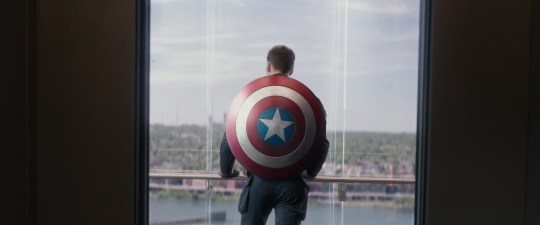
Does it pass the Bechdel Test?
Yes, once.
How many female characters (with names and lines) are there?
Five (29.41% of cast).
How many male characters (with names and lines) are there?
Twelve.
Positive Content Rating:
Three.
General Film Quality:
No matter how many times I watch this, I’m always surprised by how excellent it is. If any other future Marvel film wants to be ‘the best’, this is the movie it has to beat for the title.
MORE INFO (and potential spoilers) UNDER THE CUT:
Passing the Bechdel:
Natasha asks about the ballistics on the weapon used against Fury, and Maria responds. I’ve heard people argue that Natasha was not asking Maria specifically and therefore this does not count, but since Natasha clarifies a detail of Maria’s response (to which Maria responds again in order to confirm), I definitely think it qualifies. I have allowed a pass for far, far less in the past.
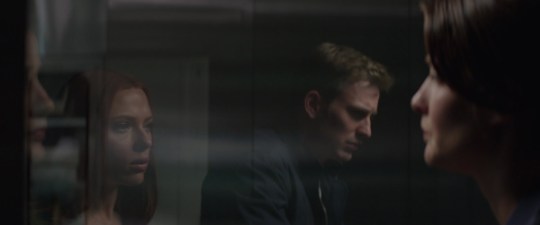
Female characters:
Natasha Romanov.
Peggy Carter.
Maria Hill.
Sharon Carter.
Renata.
Male characters:
Steven Rogers.
Sam Wilson.
Brock Rumlow.
Georges Batroc.
Jerome.
Jasper Sitwell.
Nick Fury.
Alexander Pierce.
Aaron.
Arnim Zola.
Senator Stern.
Bucky Barnes.
OTHER NOTES:
They start this movie by having Steve go for a jog and make a new friend, with a conversation ensuing that is by touches casual, light, humorous, insightful, serious, and sobering. It’s a pretty weird way to launch a much-anticipated superhero comic-adaptation action movie sequel, to be honest, but it’s also rock-solid character establishment - for the never-before-seen Sam Wilson, and for Steve Rogers whose mental state and coping skills in the modern era are kinda an open question at this point - and by getting us on level with Steve’s day-to-day (rather than Captain America’s, which comes after) they’ve immediately prepped us for a story in which this character confronts and reassesses who he is and what he stands for at a core level, and not just in a symbolic/legacy kind of fashion (a la Tony Stark). It may say ‘Captain America’ on the tin, but this is Steven Rogers’ story. This is a fantastic and well-condensed first three minutes of this film, before they fly off to deliver the action sequence we may well have expected to have received up-front.
Oh yeah, also this opening scene involves jogging around the Washington Monument, which is not a subtle detail, but I can dig it. If they’d had Steve draw attention to some Major American Landmark at some point in the movie and make a patriotic declaration of some kind, then I’d cry foul, but as-is the use of Washington DC as a setting is the hardest they bother to hammer the AMERICA button. The absence of self-fellating patriotism which I appreciated so much in the first film continues to be a virtue in this one. I do dig.
Remember how I really love it when people get hit and fly off the screen? Steve just kicked a dude off a boat and I made the dorkiest ‘hee hee!’ noise ever. Sure am glad the only reason anyone knows about that is that I just told y’all, and not because anyone actually heard me.
One day, we’ll stop getting these kinds of gratuitous butt shots of female characters in tight clothes. But it sure ain’t this day.
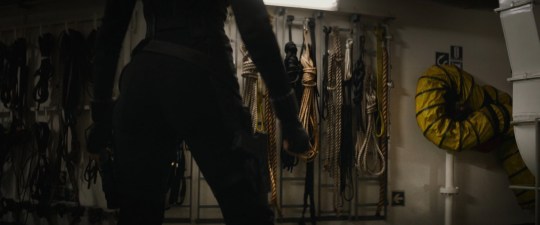
In a world of equal-opportunity sexualisation, this Cap-butt would be forgiveness enough for the aforementioned offense. But it still sure ain’t that day, friends.
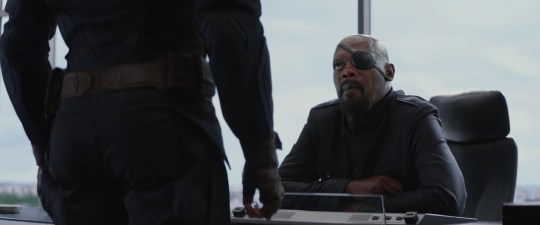
Other reasons to love that opening scene: they low-balled Sam’s counseling skills to us by having him quickly identify the best way to speak to Steve and to engage with him (as Steve, again, not as Captain America; that’s the key), and that’s what allows Steve to bond with him enough that, put in a tight spot and not sure who to trust, he shows up on Sam’s doorstep later in the film. Really tight characterisation and dynamic-building.
ALSO, Steve’s adventure to the Captain America museum exhibit reminds us all of what he’s lost - specifically, Bucky Barnes - and contextualises his encounters with Sam Wilson within the emotional landscape of Steve’s desire for close male companionship, highlighting the need which compels the formation of that bond while also accentuating the sense of Steve’s present isolation and uncertainty, robbed of any understanding confidante (the bittersweet reality of having Peggy Carter still alive, but losing herself to Alzheimer's, really hits that one home). Again, Steve’s emotional landscape is actually a vital part of the story of the film on both character and plot levels, so there’s a LOT of great show-don’t-tell demonstration in the interconnections of all these scenes, PLUS they’re doing the good work for all the other characters involved AND reminding the audience of the score so that the film can continue to draw from the past as the movie continues, without losing any viewers for whom this might be the first foray into the Captain America story. This movie is just...really well put together, guys. It’s a little shocking, how good it is.
Winter Soldier intro is too cool. Not a pun.
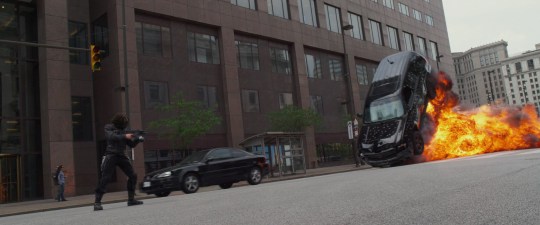
Steve takes a chance and asks his neighbour out for coffee; she declines with a soft no; he accepts even-tempered and assures her he won’t trouble her any further, and she lets him know that he’s no trouble and there’s no hard feelings. It’s all a very painless and respectful navigation of boundaries, and taken on face value (ignoring the part where she turns out to be an undercover SHIELD agent, and everything which unfolds from there), it’s a welcome example of how easy it is to take rejection graciously. Guys, be the Steve Rogers that women want to see in the world.
I want a metal arm. I don’t want to not have my current arms, they’re fine, but in an abstract version of the world where you have things purely for cool points, I want a metal arm.
The fight choreography in this film is great. It’s good watchin’.
Also the soundtrack is top-end.
“...Specimen.”
The movie didn’t need a hetero kiss thrown in there, though. I sure wish there wasn’t a random kiss in there.
“The answer to your question is fascinating. Unfortunately, you shall be too dead to hear it.”
Urgh, why Senator Stern gotta show up, be a pig about women, make his little Nazi declaration, and leave? The answer is, he really doesn’t gotta. You know what’s good shit? Not using misogyny and objectification of women to demonstrate that a bad guy is a bad guy, unless it’s actually a relevant part of the story. One day...
I can’t deal with how cool the Winter Soldier is. I’m almost embarrassed by how much the whole Silent Sauntering Assassin thing works for me.
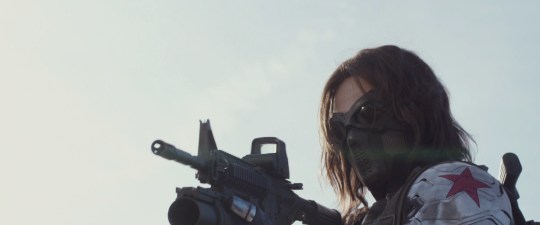
Sam Wilson brings a tiny knife to a gunfight and still gets the upper hand because he’s perfect.
THE FIGHT CHOREOGRAPHYYYYY
The Winter Soldier is barely in the film in the first hour, and Bucky is referenced in the museum but not discussed by any of the characters, so there’s no lantern hanging on either the mystery of the Winter Soldier’s identity or the conspicuous reminder of a supposedly dead character (another reason why tying the memory of Bucky in so tightly with Steve’s present state of comfortless seclusion is important and clever). If you somehow managed not to be spoiled for it already, the Bucky reveal is a real kicker of a twist.
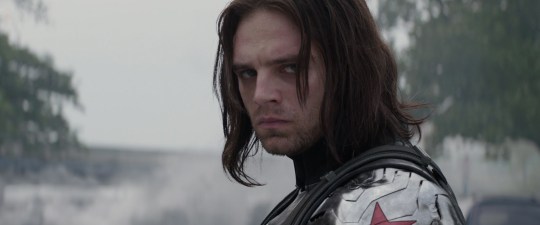
The degree to which I adore Sebastian Stan’s attention to detail in his performance has increased tenfold since The First Avenger. Dude has got nuances on his nuances.
The part of me that is emotionally susceptible to heroism is very moved by all the nameless SHIELD agents who stand up to HYDRA and die for it.
I join the rest of the world in being really disappointed that what appeared to be Jenny Agutter’s councilwoman kicking Strike Team ass was actually just Black Widow. Sorry Natasha.

The Winter Soldier shows up and murderises a heap of pilots, and the part of me that is susceptible to heroism finds itself in conflict with the part that is susceptible to the Winter Soldier’s ineffable coolness (which is itself at odds with the part of me that wants Bucky Barnes to be safe and happy). This movie got me good.
Rumlow talkin’ some shit about pain and Sam’s just like “Man, shut the Hell up,” and it’s perfect. I love him.
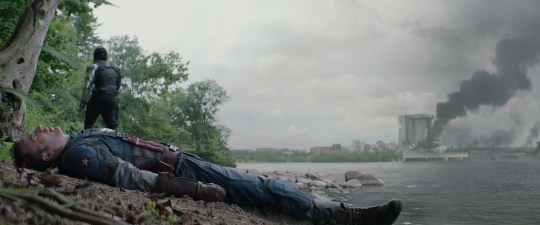
I love this film. I mean I really, really love it. Like, I mean this is one of my favourite movies in the world. Like, if we were playing that ol’ game of ‘if you had to pick ten movies, and those were the only movies you were allowed to watch for the rest of your life’, this would be one of my ten movies. That’s how much I love this film. There’s so much to get into here, so much to enjoy: it’s light and easily-digestible enough for when you just want to be entertained by something that doesn’t demand too much from you, but it also has serious depths for when you’re in the mood to dig in. It has well-crafted action scenes, but also a strong plot with powerful emotional currents. It has wonderful, charismatic actors playing intriguing characters, and most of them are good eye candy, but none of them are just eye candy - there’s a lot of complexity to unravel in the motivations and personal narratives of the leads. It’s a superhero movie, sure, but it’s also a political spy thriller. And, to top it off, it’s not only an excellent stand-alone film, it’s also a fantastic example of how to do a sequel right.

Sequel-making can be a fraught business; you’ve got sequels that are basically just pointless retreads of the original, sequels that are so different they hardly count as sequels at all, sequels that are so busy trying to be ‘bigger and better’ than the original they become ridiculous, sequels so busy attempting to capitalise on the spectacle of the original that they forget to have any of the same heart that gave the original meaningful impact, sequels that ignore that the original had a plot and themes and that maybe that stuff was relevant to its success, etc, etc...there are lots of great sequels in the world, certainly, but as Iron Man 2 and Thor: The Dark World already attested for the MCU, it is very, very easy for sequels to go wrong. For this film, I think it goes without saying that I feel they passed all of the above sequel-killing quality tests with flying (low-key red-white-and-blue) colours, hence my adoration. But, just for kicks, lets talk about how they did it.
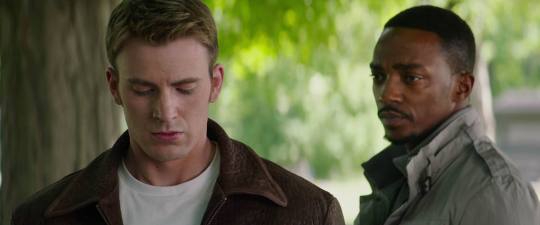
For starters, you can pretty much guarantee that this isn’t gonna be a pointless retread of Captain America: The First Avenger, since this movie takes place seventy years later and there are certain essential world elements that have fundamentally changed, such as technology, characters, and the fact that WWII ended a good while previous. But, that’s exactly how they make this story work as a sequel: they use the nature of change to give the film its shape, thematically, politically, emotionally, and in doing so they assure that everything which is different in the present builds directly from the past. Steve Rogers has not fundamentally changed, and that’s a critical anchor, considering he’s the titular character and all, but he is in a state of flux due to everything else that has changed, and his doubts inform the narrative landscape. This is not the world he remembers, and yet, as the plot unfolds and he digs into the conspiracy at his feet, there’s plenty there that is hauntingly familiar, because this is a story about how the past is still alive and kicking in the present, it has just updated to keep with the times.
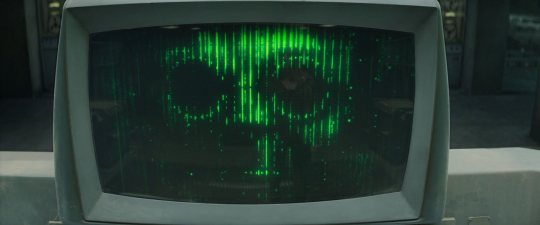
It’s worth noting that despite Captain America making the jump from the forties to the modern age without any stop-offs in between, the film doesn’t linger on or wallow in the differences in his world in any strict sense - even Steve himself (in that EXTREMELY well-crafted opening scene with Sam) is somewhat dismissive of the specifics, because he’s not dwelling on the oh-woe-things-have-changed, he’s just trying to get his head around it, adapt, and move forward (and the practical realities are easy enough, but the emotional facets? Yeah). The thing is of course, no one else shares this problem with Steve; they’ve all been around, variously, for the parts in between, and the story is still concerned with the context of the world which made all of its characters what they are, and particularly with the war that came after WWII, the war within which HYDRA reseeded and began to grow anew: the Cold War. In particular, it’s the ‘70s/’80s era Cold War, built into the political-thriller superstructure of the film itself and driven home most overtly by the Winter Soldier, heavily Russian-coded and steeped in the potent psychological horror of brainwashing, but there are other signifiers littered across the story as well. There’s former-KGB agent Black Widow, and the reference she makes to WarGames, and there’s Arnim Zola frozen in time by the ancient computer system which now acts as his ‘brain’, and then there’s the stroke of subversive genius in the casting of Robert Redford - the positively Captain America-esque blue-eyed-blond hero of many a seventies Cold War political thriller - as our primary villain, working within the United States government for the benefit of his secret European-originating agenda in true foreign-infiltration style. Of course, we can adapt all of this to fit the radicalised terrorism and technological paranoia of modern times (and those elements are alive and well in the text with the surveillance-state fears represented by the helicarriers), but the historical timestamping is important to the trajectory of the film; times change and things grow increasingly subtle and complicated, but the core dilemmas that call people out to fight are instantly familiar. In that sense, Steve Rogers hasn’t missed much at all.
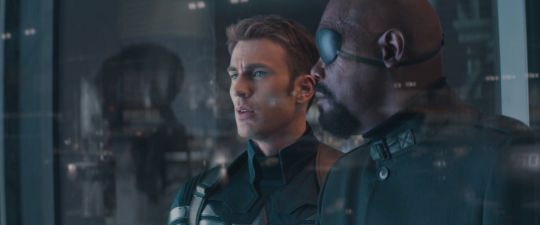
The war that calls Cap to arms this time around may be more subtle than the openly-fought battlefields of WWII, but it is no less global or insidious; the new ‘improved’ HYDRA may not be led by a literal Nazi who peels off his own face, but the cold political calculations of Alexander Pierce are much more frightening for their realism (an aspect of the film which has become increasingly prescient for the modern era since the movie was released), and the fascist supremacist dogma that compels these villains to attempt to reshape the world with the blood of millions is drawn from the same poisoned well; this is an escalation of the same enemy that Captain America faced before, only much closer to home. And while the passage of time has benefited the old evils in allowing them to entrench and fester and craft re-branded, more socially-accepted versions of themselves, it has not been so favourable to the positive familiar things from Steve’s past: it has claimed Peggy’s memory, and rotted SHIELD beyond recovery. And then, there’s what it’s done to Bucky Barnes.

Fake-out character deaths are a major staple of the superhero/comic genre, and not one I love, since it tends to take the power out of apparent-death scenes and leaves the drama feeling contrived, and while the Bucky reveal is not entirely free from that cynicism, it sells itself well on delivery. For starters, it packs a wallop in additional drama instead of just neatly undoing that which already existed (Nick Fury’s ‘death’ and reveal, on the other hand, is more in the classic line of cheap and inconsequential), and it ups the personal stakes for Steve in exactly the same way as Bucky’s ‘death’ did in The First Avenger. Crucially, the fact that Bucky is the Winter Soldier doesn’t alter the wider narrative in any convenient way, such as providing Captain America with the key to stopping him or resolving the other conflicts of the plot through his connection; the Bucky reveal reconnects the story to Steve’s emotional journey, which is exactly where it started before Shit Got Crazy - there’s a good reason they spent the first half hour of the movie on charting Steve’s mental state. There’s a sharp division between Bucky Barnes and the Winter Soldier, despite them both inhabiting the same form, and it’s a mirror of the division between Steve Rogers and Captain America: regardless of all assumptions to the contrary, the two are mutually exclusive entities. ‘Captain America’ is not a person, he’s a symbol, and he’s manipulable in that way, he can be propagandised, his image and actions are a tool turned to the purposes of others at the expense of the human underneath; Steve recognises this (and has since the first film), and he holds this secondary persona at a remove and does not define himself through it. This is what Sam’s keen social instincts pick up so quickly in the beginning: treating Steve as Captain America is the wrong approach, it fails to connect, because Steve is not the uniform, Steve has doubts, Steve could give up the shield; Steve is a person. Bucky doesn’t have the same luxuries, in opportunities, in company, or in the cognizant ability to define his own identity, but even without the personal attachment of their history, Steve is uniquely positioned to understand the difference between the Winter Soldier and the person buried beneath the title. If it was not Bucky, specifically, the visceral emotion of the mirrored experience wouldn’t land quite as strong, but either way the Winter Soldier is the realisation of Steve’s deep-seated fear of being made a puppet, an unthinking enforcer too heavily indoctrinated into patriotic subservience to recognise the despotism that has replaced his idealism.
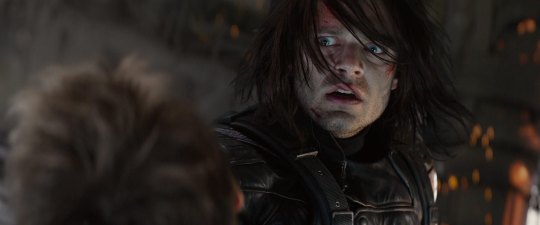
I said at the top that this is, ultimately, a Steven Rogers story to which ‘Captain America’ is an accessory, and not the other way around, and that’s a fact at the heart of what makes this film work - on its own, and as a sequel. The fore-fronting of Steve as a character in his own right and not just ‘Captain America’s real name’ was key to avoiding any cloying patriotism overriding the narrative of the first film, and it’s doubly important now as both Steve and the Captain America brand re-situate outside of their original context. It’s easy to strip back the specific trappings of Captain America and still have this movie function just right, because for all the action and intrigue, it is essentially a character piece about Steve Rogers figuring out his place in the world and reclaiming the moral compunctions which have been presumptuously attributed to the lofty symbol of his alter ego, and not the struggling reality of everyday life. Captain America is what he is and how he is not because it sounds good or because it makes for positive PR or because it’s nice to have legends from the good ol’ days; Captain America is the embodiment of scrappy little Steve Rogers’ grit and determination to live up to what he believes in, come Hell or high water or the gravest of consequences. Steve begins the film at odds with himself, unsure if there’s a place for his shameless idealism within the mess of modern life; he’s going through the motions of being Captain America, but he’s uncertain of what it means to him at this point, or where it’s headed. He finishes the film having gained something vital: a mission, but it’s not a professional job for Captain America, it’s a personal mission for Steve Rogers, and that’s much more important. Captain America is just an idea; Steve Rogers is the reason it matters, no matter what war, what time, what place, or what flag.
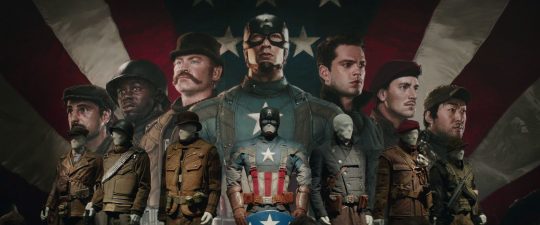
#MCU#Marvel Cinematic Universe#Captain America: The Winter Soldier#Bechdel Test#female representation
17 notes
·
View notes
Link
Tetsuhide Yamaoka, Australia-Japan Community Network July 4, 2019 11:19 pmfujioka nobukatsu, graduate project, Kent Gilbert, miki dezaki, shunichi fujiki, shusenjo, sophia university, the main battle ground of the comfort women issues, tony marano
On June 15, five people who appeared in a documentary called “Shusenjo: The Main Battleground of the Comfort Women Issue” (Tofu Films) sued the director and the production company for the film, bringing the battleground from the big screen to the courtroom.
Graduate Project Gone Awry
Kent Gilbert, Tony Marano, Nobukatsu Fujioka, Shunichi Fujiki and Yumiko Yamamoto filed charges against a young man who called himself Miki Dezaki for using footage of them in a commercial film without their consent.
The story goes that in 2016, Miki Dezaki approached several people for interviews on the comfort women Issue as part of his graduation project at Sophia University. For that purpose, Dezaki secured the consent of several people, including the five people involved in the case.
After his graduate school project, he apparently proceeded to do more filming, add music and further edits, making it into a commercial film shown publicly for the first time on October 7, 2018.
The plaintiffs have charged that the consent they gave was for Dezaki’s non-commercial graduation project and not for any other purpose, including a commercial film. The charges further accused Dezaki of uploading footage of Marano to Youtube without his consent.
The plaintiffs have sued to stop the film from showing. In addition, they have sought damages of ¥ 5,000,000 JPY ($ 46,420 USD) to Kent Gilbert and Tony Marano, and ¥ 1,000,000 JPY (¥ 9,284 USD) for each of the other three people.
How it Started
Let’s take a step back to 2016, when Miki Dezaki approached several well-known conservative opinion leaders, introducing himself as a graduate student of Sophia University. He asked for interviews with them in order to make a documentary film focused on the comfort women issue. He said the project was to complete his master’s degree.
One of Dezaki’s emails said, “As I researched, I found the comfort women issue was more complex than I had read in the Western liberal media. In researching, I found there was little evidence that the women were coerced to become comfort women, and that the lives of the comfort women were not as bad as some activists or experts would argue. I have to admit that I had believed the media reports, but now I have doubts…. As a graduate student, I have an ethical obligation to conduct interviews with you with respect and fairness. Also, since this is academic research, there are certain academic standards and conditions which must be met, so it will not be biased journalism.”
He approached Kent Gilbert, Yoshiko Sakurai, Nobukatsu Fujioka, Mio Sugita, Yumiko Yamamoto, Tony Marano (also known as the “Texas Daddy”), Shunichi Fujiki (Texas Daddy Japan secretariat), among others.
All of them took Dezaki at his word and expected he would make a fair and neutral documentary film as promised. On that basis, they agreed to interviews with him.
The Product Is Not What Was Promised
Time passed. On March 27, 2019, I headed for a small theater in Shibuya, where I had heard that a preview of the film would be screened. By then, I had also heard that all of the above-mentioned people Dezaki interviewed regretted cooperating with him on the film, which, contrary to their expectations, turned out to be another propaganda film about the comfort women.
I wondered what went wrong. The film was supposed to be a fair debate between those who claim the comfort women were sex slaves and those who say they were not.
Advanced information on the film indicated that advocates of the “comfort women are sex slaves” view who appear would include Yoshiaki Yoshimi, Etsuro Totsuka, Hirofumi Hayashi, Koichi Nakano, and Takashi Uemura.
Mihyang Yun, a representative of The Korean Council for the Women Drafted for Military Sexual Slavery by Japan, and Park Yu-ha, a professor at Sejong University in Seoul who wrote The Comfort Women of the Empire (2013, in South Korea, now banned) and was prosecuted for it in South Korea, were also said to make an appearance in the film. I wanted to see the film for myself to learn what was actually said.
The title of the film was Shusenjo: The Main Battleground of the Comfort Women Issue (Independent, 2019). The credits said it was written and directed by Miki Dezaki, who was billed as a Japanese American YouTuber in a leaflet on the movie. The flyer promised that the movie would be “Surprisingly thrilling!!!! This is the most aggressive documentary film today.”
As I watched, speakers appeared one after another making various claims. But was it “surprisingly thrilling,” as Dezaki’s flyer had promised? No, and the reason was clear: this film was far from fair.
Dezaki Set the Tone
The film’s tone made it clear that Dezaki was not neutral at all. Rather, he stood by those who claimed comfort women were sex slaves. While saying he would explore the issue from a neutral position, he started by expressing disdain for the views of those who said comfort women were not sex slaves, calling them “revisionists” and “denialists” right from the beginning.
His tone was very rude to those who cooperated from the opposition side. It raised questions about his motives, and I could not help but suspect that his email promises to those whose views he disdained were simply a trap to induce them to appear in the film.
Another point that caught my attention was that Dezaki avoided interviewing the most prominent scholars on the comfort women issue when their views did not fit with his conclusion.
Since Dezaki included in the film’s debate interviews with Yoshiaki Yoshimi and Hirofumi Hayashi, experts who have long been proponents of the sex slave story, he should have interviewed scholars with comparable qualifications on the other side, such as Ikuhiko Hata and Tsutomu Nishioka. This failure alone demonstrates the lack of balance in his work.
I was able to ask Dezaki in person about this point on April 4 at The Foreign Correspondents’ Club of Japan, where a preview of the film and an interview were held. He answered like this: “As for Nishioka, I saw his views on the internet. I thought he was not adding much more than others say and did not contact him.”
Then did the film offer any meaningful argument at all?
Were Comfort Women Coercively Recruited?
At one point, the film showed a 2007 clip of Prime Minister Shinzo Abe answering questions in the Diet. He said: “There were no such cases as government authorities intruding into private houses and forcibly taking women away. There was no coercion.”
Then Totsuka Etsuro appeared for the purpose of criticizing Abe. He was the lawyer who coined the word “sex slave” and spread it in the United Nations. He said: “Abe claims that the women were not coerced because they were not forcibly taken away against their will and tied with ropes. But, legally speaking, ‘coercive’ means ‘against their will.’ Then, ‘being deceived’ is categorized into ‘coerced’ because it is ‘against their will.’ Most Korean women at that time were deceived.”
In other words, since there was no coercion and there were no reported cases of forcible removal of women in the Korean Peninsula under the Japanese governance, he expanded the definition to include the feeling of “being deceived.”
Gilbert and Fujiki said: “The women were recruited mainly by Korean dealers. There would have been cases in which women were deceived by the [private] dealers.”
Mio Sugita added, “Newspapers at that time reported on many cases in which malicious dealers were arrested by the Japanese police.”
In the film, though, Hayashi Hirofumi refuted them, saying, “Reports in newspapers at that time had nothing to do with the coercive recruitment of comfort women. Certainly, the police arrested malicious dealers who deceived women and prostituted them. But the police overlooked dealers who were requested to do so by the military.”
I wish Hayashi had explained his statement by providing specific evidence in the film. How could the police distinguish malicious dealers from those who had received a request from the military?
I had heard of such claims before, but they were found to be groundless. If the police had been so discriminatory, it would have been very difficult to maintain security.
Who Called Them Sex Slaves?
Next, those who believe the comfort women were not sex slaves spoke in the movie, showing that the comfort women were well paid. They were able to save and/or send their money to their families. When their contract came to an end, they were free to go home. They enjoyed shopping. They went to sporting events and parties with Japanese soldiers. They were far from sex slaves.
But the advocates of the sex slave viewpoint counter the argument by claiming that, according to international law today, they were slaves.
Sex slave advocate Yoshiaki Yoshimi’s claim was particularly interesting. He refuted the argument that the comfort women had time for recreation with a convoluted reference to American Negro slaves, saying: “I think their daily lives were so hopeless that they couldn’t live without such recreation. For example, American Negro slaves gathered and had concerts or dance parties on Saturdays and Sundays. They also went hunting. They were so hopeless that slave owners had to allow them to do so to survive.”
He and other sex slave advocates failed to mention, however, that some Japanese soldiers fell in love with comfort women and married them, and that there were former comfort women who cherished the memory of Japanese soldiers who were their former lovers. The advocates of the sex slave argument in the film instead appear to want simply to disgrace Japanese by all means.
Kohki Abe, a member of the faculty of international studies at Meiji Gakuin, appeared next in the film. He claims that, based on international law, the comfort women are defined as sex slaves.
He said: “Slavery is a situation in which someone is utterly under the control of another. Even if the comfort women were able to earn lots of money and go out for pleasure, they were under another’s control and had to get permission to do so. Therefore, they were slaves.”
If that’s true, then it sounds like today’s ordinary salaried workers are all slaves!
If he wanted to make a claim based on international law, the claim should be either “It is technically possible to define them as slaves according to international law,” or “All prostitutes throughout history, not only the wartime comfort women of Japanese military, are defined as sex slaves according to international law.”
Nippon Kaigi (The Japan Conference)
This film was so long that I started feeling tired. Then, unexpectedly, the words “Japan Conference” suddenly appeared on the screen and woke me up. The Japan Conference has nothing to do with the comfort women.
Setsu Kobayashi, professor emeritus at Keio University and a constitutional scholar, began to talk. According to him, the Japan Conference has the power to influence the Abe administration as it intends to revive the constitution of the empire of Japan to return the country to an era where basic human rights are denied. And, in his view, Yoshiko Sakurai is leading their campaign.
He continued guessing, “The Japan Conference is supported by Shinto shrines, including the Yasukuni Shrine. Sakurai Yoshiko probably has an office for free within the shrine’s grounds.”
He then came to a very strange conclusion: “The Japan Conference’s doctrine of getting back to the pre-war Japan is terrifying. But I am determined to fight against it even if I get murdered in the battle.”
What a delusion! The Japan Conference and Yoshiko Sakurai have never expressed the slightest intention to revive the constitution of the empire of Japan.
And I have very good news for Kobayashi. His name is seldom mentioned around the Japan Conference. There is no one who has a reason to kill him. He is 120% safe.
I asked the Japan Conference whether or not Dezaki made a request to interview them while making the film. The answer was no. The Japan Conference also released a statement denying Dezaki’s accusation.
After all, The Main Battleground of the Comfort Women Issue is a video made by a YouTuber who cheated the people who were willing to help him with his supposed graduation thesis. Instead, he hid his true intentions of promoting a conspiracy theory which he never verified.
All Dezaki has successfully achieved is to deepen the conflict and distrust between people who have different opinions on the comfort women issue.
Author: Tetsuhide Yamaoka
1 note
·
View note
Text
Meena Harris, Building That Brand

Meena Harris, a lawyer and former tech executive, used to make statement T-shirts as a side job. Her most famous read, simply, “Phenomenal Woman.” (Perhaps you saw it on Instagram, worn by celebrities including Serena Williams, Lizzo, Ciara, Viola Davis, Laverne Cox and Eva Longoria.)
She also made hats for the “Phenomenal Mother” and sweatshirts for the “Phenomenal Voter.” All benefited various charities.
But during a summer of mass protests against racism and injustice, Ms. Harris’s apparel took on new resonance. Naomi Campbell wore a “Phenomenally Black” T-shirt for a high-end fashion event in July. Regina King accepted her lead actress Emmy in September wearing a shirt by Ms. Harris, with an illustration of Breonna Taylor and the words “Say Her Name.”
Ms. Harris’s passion project became her full-time job; she left her role as head of strategy and leadership at Uber to run her own company, called Phenomenal. She also picked up another side-gig — one that brought her more visibility than any prestigious job that came before it: campaign surrogate for her aunt, Kamala Harris, now the vice president-elect.
At the time, Ms. Harris, 36, made it clear that her clothing brand was “not something that I want to be using to promote the candidacy of a family member.” In a phone interview, she added: “There’s a lot of cool people in my family that do cool stuff. And this is my thing. I’m doing my own thing.”
But her relationship to the vice president-elect is a fact that can’t be separated from her story or that of her business.
As a surrogate, Ms. Harris offered insight into her family in ways traditional (introducing her aunt in a video at the Democratic National Convention) and more novel (during the primaries, she defended her aunt’s criminal justice record against progressives who disparaged her as “a cop” in a series of Instagram stories).
She also sold several Kamala-related sweatshirts, including one with the letters “MVP,” for Madam Vice President; one emblazoned with the phrase “I’m Speaking,” referring to the much-memed moment from the vice-presidential debate; and a third with the names Sojourner (Truth), Harriet (Tubman), Shirley (Chisholm) and Barbara (Jordan) stacked above Kamala’s, released in partnership with Win With Black Women.
But putting a campaign slogan, like “Kamala for the People,” on a shirt would be too explicit, Ms. Harris said, crossing the line she’s drawn to protect her brand and establish her own identity.
“I look at her as another figure in history and someone to be celebrated,” she said of her aunt — for example, with a holiday sweatshirt reading “Deck the halls with smart, strong women, Kamala-la-la-la-la-la-la.”
‘What’s Our Message?’
The name of Ms. Harris’s company comes from a Maya Angelou poem, published in 1978: “I’m a woman / Phenomenally. / Phenomenal woman, / That’s me.”
First sold during Women’s History Month in March 2017, the “Phenomenal Woman” shirt was meant to remind people that Ms. Angelou “came before us, and it was women like her,” Ms. Harris said, “who made it possible for the Women’s March to happen in the huge way that it did.”
She planned to split profits from the shirt between seven women’s organizations. “I thought we’d sell a couple hundred shirts, if I got enough of my friends and family to support,” she said. But on release day, she sold more than 2,000, she said. (It was modeled online by friends, including Issa Rae, who was a college classmate, and America Ferrera.)
At the time, Ms. Harris didn’t know exactly what to do with the enthusiasm, she said: “How do we keep this going? What are we talking about? What are we doing? What’s our message?” So she gave herself a mission: raising awareness around issues affecting underrepresented communities.
The Breonna Taylor shirt, released in August, flooded social media, buoyed again by a flock of celebrities. On its front, the black tee read “Arrest The Cops Who Killed Breonna Taylor” in pink text (Ms. King wore it backward at the virtual Emmys). Profits from the $45 shirt benefited the Breonna Taylor Foundation. (Depending on sales, other Phenomenal products raise anywhere from $5,000 to $150,000 for a nonprofit, according to Ms. Harris.)
Inevitably, the simple T-shirt company has become a multipurpose venture, with a content arm, Phenomenal Media (for publishing articles and putting out full-page newspaper ads), and a creative agency, Phenomenal Productions (which will make videos, products and other content for ideologically aligned clients). On Jan. 19, Ms. Harris will publish her second children’s book, “Ambitious Girl.” And on the following day, one of the characters in her first children’s book, “Kamala and Maya’s Big Idea,” about two sisters taking on a community project, will take her oath for the second highest office in the nation.
‘Entrepreneurial Tendencies’
Kamala and Maya were raised primarily by their mother, Shyamala Gopalan, a scientist and activist.
When Maya was 17, she had Meena. She raised her daughter with the help of her mother and sister, while earning degrees and building a career in law and progressive policy. Maya worked as a law school dean, executive director of the A.C.L.U. of Northern California, adviser to Hillary Clinton, and her sister’s campaign chairwoman — among other roles. Since 1998, she has been married to Tony West, who was the associate attorney general during the Obama administration and is now Uber’s chief legal officer.
Young Meena Harris, surrounded by lawyers, wasn’t nudged toward law. Her first job, after graduating from Stanford University in 2006, was as a community operations manager at Facebook — just as it was expanding to the general public, no longer available only to college students.
Ms. Harris also joined the 2008 Obama campaign, in youth vote organizing and grass roots fund-raising. But finally, she decided to start law school, as if it were the “path of least resistance,” she said.
In 2014, two years after she graduated from Harvard Law School, Ms. Harris was working as a cybersecurity and data privacy attorney in Washington, D.C., when she had her first “kind of fun, provocative” idea for a T-shirt, she said. Inspired by the early Mark Zuckerberg business card that said “I’m CEO, bitch,” her tee read “I’m an entrepreneur, bitch.” (These were the “Lean In” years.)
By 2015, Tyra Banks was wearing the shirt onstage during press interviews. And Ms. Harris — who’d always identified as a creative person with “entrepreneurial tendencies,” she said — was feeling, for the first time, like an entrepreneur.
Statement as Brand
T-shirts are not a new form of expression, either of values or of protest. But unrest during the Trump administration — and the steady rise of both political expression and posturing on social media — has inspired a great number of them. Mugs, onesies, pet collars, phone cases and fanny packs, too.
In September 2019, the sisters Kate and Lisa Sokolov founded Social Goods, an online boutique for activist apparel. All of their sales include a donation — on average 25 percent of the proceeds, the founders said — to various related nonprofits. Phenomenal was one of the first brands sold on their site.
The founders see merchandise as a “catalyst and entry point for change,” Kate Sokolov said — “a way to get people to start talking and keep talking about issues.”
It’s the “keep talking” part of it that Ms. Harris has been considering herself lately.
“I think this is going to be a big question for us next year. When we don’t have the constant drama and attacks that are coming out of the administration, how do we keep people engaged in a meaningful way?” she said. “Not just the people that have been doing this work, and will continue doing this work, and are literally doing it all day every day. But regular folks.”
Communicating serious messages through a medium like apparel is tricky. Tone is paramount. Nuance can be lost. There’s only so much room on a tee.
“Just because a bunch of people liked it doesn’t mean that you should go put it on a T-shirt and sell it,” Ms. Harris said, of ideas she knew would be popular but messy.
Not everything sold by Phenomenal has a social justice message. Addressing work-from-home culture, Ms. Harris released sweatshirts in 2020 that read “Can everyone mute please?” She’s also sold pieces without phrases, like a one-piece swimsuit printed with Sonia Sotomayor’s face. Proceeds from these more general items are donated to a spread of nonprofits, rather than to a specific cause or organization.
One of those nonprofits is Essie Justice Group, an organization for women with incarcerated loved ones. Gina Clayton-Johnson, the group’s founder and executive director, said working with Phenomenal has relieved some of the overwhelming pressure to fund-raise.
“My team needs to be writing policy, running healing circles and organizing outside jails and prisons. They don’t need to be setting up chairs at a fund-raiser, or putting cute little sequins in envelopes,” Ms. Clayton-Johnson said.
‘Breaking Away’
On a phone call in August, the day after making her Democratic National Convention debut, Ms. Harris described herself as happy but “running on fumes.” She’d spent that night “drinking wine in a furry bathrobe” while watching the videos and speeches, she said.
During a conversation a few months later, the election was over but the holidays were approaching, and Ms. Harris’s partner Nikolas Ajagu, who works as an executive at Facebook, had just told her that letters to Santa from their two daughters (ages 2 and 4) had gone missing. There was a pile of laundry on the couch and the house was a “mess,” she said, using an expletive.
Because of her work with Phenomenal, Ms. Harris already had a robust following before her aunt became Joe Biden’s running mate in August. But starting that month, she began gaining followers on Twitter and Instagram in droves.
Accordingly, she has faced more criticism, trolling and general scrutiny for actions associated with her family. One recurring topic is Prop 22, a California ballot measure approved by voters in November, allowing companies like Uber to continue classifying drivers as independent contractors rather than as employees.
Ms. Harris’s stepfather is the top lawyer at Uber, which spent millions trying to pass the measure. (Her aunt strongly opposed it.) Ms. Harris was dragged into the fight as well because of her former job at Uber. In November — after the election — she decided to make it clear that she voted against Prop 22.
“I think it’s a very simple thing,” she said. “I’m very lucky to be in a family of a bunch of successful people who are doing a lot of different things. There’s interesting dynamics around that, but I’m my own person with my own views and my own platform and my own aspirations.
“Sure, you can be curious about somebody’s relationship with their family, or how their communications around these things are,” she said. But at the same time, she noted, “I’m not an elected official. I’m not formally accountable as a public servant, and I think sometimes, people do kind of treat you that way if you have a public profile.” (She later added: “It’s weird to talk about yourself as having a public profile.”)
When she talked about her decision to leave Uber in June, Ms. Harris used phrases like “breaking away” and “liberating myself.” For years, she’d felt like she was on a “treadmill of checking prestige boxes” — elite schooling, a law degree, a high-powered tech career, a treadmill powered by the ambition of her first-generation immigrant family.
Still, that ambition was fairly contained to the worlds of law and activism, “which of course, are core to who I am and how I view everything,” she said.
“No one in my family, other than me, has a business-minded bone in their bodies. I was not exposed to that at all,” Ms. Harris said. (Her stepfather didn’t take a job in the corporate world until 2014.) The idea of entrepreneurship? “That was just totally foreign.”
Now, she’s on a new treadmill. “I just didn’t really know the path to getting there,” she said.
from Multiple Service Listing https://ift.tt/2LPlJfw
0 notes
Note
Ok my biggest gripe with civil war ( the movie not comic) is there obviously one right side with that conflict. Like before the movie even starts. Even if it was a Avengers movie as opposed to a cap movie. Because this whole franchise is about superheroes in the traditional sense these multiple Paragons in their own right who enact vigilante justice based on their own strict moral code. If they have to be kept in check by an administrative body who organizes it then the genre can't be 1/2
traditional superhero anymore. And so unless you want as a franchise to move in that direction the accords have to be a bad idea. They can't be right in a world where you have to have traditional superheroes. So team cap has to win. If you give Tony valid points on any level ( which you must to a degree for this conflict) its valid criticism a discomfort towards superheroes being vigilantes in a franchise that will do nothing to alter that discomfort and celebrate that vigilantism. 2/2 pt1
So in the end this conflict is pointless. Its a bit like Tony's we have to build a suit of armor around the world vs Caps the de escalation is better. Our world is not the MCU. The MCU has to escalate things because its a actiony superhero story. The world has to be at stake at some point because it's a superhero story. The other characters don't know that for sure but you the audience does. Not all conflicts in our world can be meaningful in the MCU. Writers don't always consider that 2/2pt 2
Why was my first take on your ask that AoU did CW better than CW.
Markus/McFeely were the worst writers to be given such a weighty story, because the comic event had fully reshaped the comics and the direction they went in. Everything had to change because of this. And they can’t be trusted with that. It worked for CATFA because that story was seventy years divorced from the current time that IM and the others were in. They couldn’t even write a movie that kept canon with the rest of the films - CATWS ends in SHIELD ending while a show about SHIELD agents is still being made and intends to keep making seasons. CW was the tie-in of all tie-ins for its time - you had fifty cooks in the kitchen trying to keep up with the head chef. The movie was already deemed iffy to be tackled as a third Avengers movie, but as a Cap film? And with writers who don’t care about other movies? And people were shocked that right after Thor 3 they killed everyone who was just saved at the start of Avengers 3?
And correct me if I’m wrong, did they even answer the question of who was right and who was wrong? Honestly, the answer I got from the movie is that they both suck. And movies later, they were still being all mopey and shit, and magically they get over it mid-Avengers 4 with no explanation. Because the heroes still have to answer to Ross in Avengers 3 (again, the dismantling of SHIELD was stupid because they, a government agency, were the ones in the comics the heroes had to report to, and it would’ve made all the sense, but imagine these writers and the Russos using sense in their own movies), but then they decide nah, we don’t want to, and get no repercussions even though Ross is an established person who would fully try to stop them even if the world is at stake. So the movie has their cake and eats it to, but wants you to forget that someone threw the cake on the ground a scene ago.
They’re awful writers, and CACW is an awful movie, and seriously, they never tell us who is right and who is wrong. But the writers are wrong.
~Mod R
0 notes
Text
Since it crossed my mind...
Things in Endgame that I was okay with:
-Falcon getting the shield
-Carol Danvers repeatedly living up to the hype as she kicks the shit out of Thanos over and over
-Steve using Mjolnir
-Tony reacting to Steve like they’re ex-boyfriends while Tony somehow looks more like Jeff Goldblum in a Marvel movie than Jeff Goldblum looks like Jeff Goldblum in a Marvel movie.
-That’s America’s Ass. / That Really Is America’s Ass.
-Tony meeting his dad in the past
-On Your Left
-New Asgard basically being ten feet to the left of where Odin said it could be
-Valkyrie, Korg, and Meek
Things I was not okay with in Endgame (in no particular order):
-She’s Got Help, because if you’re going to push one character super hard and do a super women group shot, don’t fucking yank the chain on it right when they’re about to accomplish the goal. Remember Infinity War? Remember how you managed to push all of the women into the same ditch for no reason? As fucked up as that scene was in terms of gender segregation, at least it ended with the goal being met. (The goal being ‘kill the woman here who matters the least to the marketing team’.) She’s Got Help just ended with all of the involved characters collectively failing to cut a straight line through enemy forces despite the fact that half of them could fly.
-Having the first openly gay character in a Marvel movie be some nameless, useless yabbo who brings it up during some fucked up survivors guilt sharing circle, and suddenly I feel like I’m watching the AIDs circle scenes from Rent as Steve ‘America’s Ass’ Rogers makes it about him waking up in the ice for the fiftieth time.
“We have to move on”, he says, as I sit here knowing that this is a three hour long franchise movie set after they merced half of all life and ninety percent of the cast.
And that most of them would be coming back.
-A rat in the impound is the thing that brought Antman back. Never mind that out of every piece of useless clutter in the movie, the only thing to get impounded is the minivan with a minimizer in it, but that a rat has to be there to confirm that out of four shrinker heroes with degrees, not one of them thought of a timed return feature.
-Actually, the fact that the van alone got impounded by anybody after half of all life got dusted is really bugging me now. Did the municipality of that town specifically just get avoided in the snap all together? That street? Was the guard for the impound a hoarder who stole it? He must be, because why would you pay someone to guard an impound for five years after the streets have become so abandoned that people don’t even bother removing bicycles anymore?
-Who did the census poll of people who got dusted? How long did that poll take? How did Scott find the memorial park? Is there only one memorial park? Are there memorials in every city? Why did Scott go to a memorial park when he could/would have just gone home first? Nothing is explained by the first prolonged scene with Scott, and it is so slap-dashed together that things that should not be questions are popping up.
-The fact that Natasha is now such a disaster that she makes a pb&j sandwich while in the middle of a hologram conference call while everyone else, including the talking space raccoon, has the wherewithal to stay standing and look presentable. Also, she is so far gone that she doesn’t know how to handle something like an underwater earthquake. You’re an Avenger, not a Rescue Ranger. Natural environmental hazards are not your problem.
Captain Ass then walks in again, talking about how ‘we’ don’t move on. Is this about SHIELD? Are you talking about SHIELD? Because if I remember correctly, that one was pretty explicitly your past coming back from the grave to bite your *American* ass. You didn’t bring it back with all your moping about WW2 pussy, it came for you with red lights on. Also, stop moping about WW2 pussy. You watched her punch a dude once, that is not grounds for a century long obsession with one woman who ended up not doing her job right because she ended up letting Super Nazis into SHIELD. If this isn’t about SHIELD, then stop going to weird ‘we don’t know how to stop putting ‘depressed masturbating’ on our resumes’ meet groups.
-Actually five years is a ludicrously long time for people to still not be picking up after themselves. It’s like the writers wanted everyone to be super depressed about the disaster, but they ignored the fact that the population explodes after shitty stuff happens. Touch of realism? Scott should have been wading through streets filled with toddlers and pregnant women. The kid on the bike? Should have had a baby seat on the back with the unfortunate implication that it was his kid. You want to make it funny as a man frantically searches for his daughter’s name in a strangely normally populated cemetery(which is clearly what they were going for with his line delivery)? Have him trying to do a superbowl shuffle through roaming packs of three-to-five year olds.
(Actually, would the snap have taken pregnant women? Snap, no baby, five years later, snap, back to being pregnant? Snap, no mom?! There’s got to be at least one chosen toddler out there with the doom world prophecy on her that since she was born from the ashes of her mother’s corpse, she is now destined to Flay The Bones of The Corpse Lord, Lord of Corpses, but her mom came back, so now it’s time for a Capri-Sun and a nap.)
-Tony’s whole... Look, it’s really hard to believe that Tony ‘Box of Scraps in a Cave’ Stark had multiple crashed spaceships, the ruins of a technologically advanced planet, an alien cyborg/gynoid woman with spacecraft engineering knowledge, and a nanotech Iron Man suit on his person and couldn’t manage to somehow become a planet-hopping rad dude living the space punk dream with his ‘robo-sister’. Honestly, Tony should have met Carol when he accidentally bumped into her at a party after they’d both just saved each half of the planet that they were partying on. Tony should have been wearing sunglasses that he’d made himself from two different colored pieces of space crystal, and Carol should have pointed out that he looked like he needed a burger. He asks where they could find such a thing (after doing that thing he does where he repeats the topic of conversation multiple times because he’s excited and trying to process what his brain is coming up with), and he flies his zero-G party barge after her and steps out to find his wife after five long painful lonely years on the road. Then he tearfully tells Carol that he’s going to have to cancel on that burger, and she’s like ‘no problem, Major Tom’, which is somehow the most dated thing Tony or Steve has ever heard.
I must emphasize though, Hetero-Chromatic Space Crystal Sunglasses. With a Stardust Iron Man suit.
-The fact that I’m supposed to believe that the Infinity Stones would allow themselves to be destroyed, and that Ant Man came back not so that he can find out that they were only shrunk to molecular size, but so that we can get some nonsense time travel plot instead. Seriously, Ant Man could have come back because the Space Stone slapped him in the dick and resized him and he didn’t know what it was.
-The fact that time travel in Endgame works (pretty explicitly) on DBZ rules and not a more cinematically satisfying set of rules. (i.e. hey, there’s now a world timeline where the Avengers initiative failed spectacularly after the Battle of New York because Tony had a heart attack, Loki got away, the Tesseract and the Staff went missing at the same time, and Steve was found ass up after falling down about ten floors worth of glass and stairs after giving away that he was a Hydra agent(?!) but hey at least all of these stones are accounted for.)
-Steve creeping on Peggy. Just... Steve creeping on Peggy. Eugh.
-The fact that Nebula apparently has intergalactic/universal wifi coming out of her at all times, with an automatically updating memory bank that uploads all memories she has to a cloud storage that can then be accessed by anybody that plugs into her. Just have the time traveling version of her get found by scanners and get recalled the old(ish) fashion way. All you have to do is have Squidward-Frieza at the keyboard going “Oh my, it appears some naughty little monkey has stolen one of our computer units. Shall I have it brought back, my lord?” and then he sends a stall signal to Nebula’s systems and they just track her down. As it is, she could have just left if she hadn’t been sitting there watching her memories get rooted through. Hell, have that be the turn around, where she leaves, everything goes as planned, and suddenly Thanos and his BS is waiting for them when they go to put everything back.
-All of Thor. Just... all of Thor. The petty killing Thanos at the beginning, the ‘haha look he’s fat now’, the bullying kids on Fortnite, the utter bullshit of giving up on leading his people because ‘he has to be who he is and not who he’s trying to be’ like he didn’t explicitly save the Asgardians because he made do with what he was given during Ragnarok, the fact that he didn’t say one word to any of the Lokis in the movie but was a blubbering idiot over his mother. (Also, there is no good god damn way that Frigga saw fat busted old Thor and went “Yeah, I’m okay with dying and letting that happen.” So there’s a new timeline there.)
-The entire exchange between Clint and Natasha over the Soul Stone. Like, the whole thing is supposed to be a deep and meaningful conflict, but the problem with that is that the story of the movie hasn’t placed either of them in very high regard. Natasha’s a washed out wreck, apparently spending the last five years sitting in the Avengers compound and making crappy looking sandwiches while Clint went out and became an international murder spree. This isn’t them in their prime arguing over who’s taking the fall, it’s two people that we as the audience have had maybe an hour and a half to get to know. And less than half that time to like them. Hell, it’s pointed out in this movie that Natasha needs to grow a little since she can’t let go of the past and that she needs to be able to move forward through tragedy. Having to watch Clint sacrifice himself so that she might have a chance to save his family would have fit that arc. But no, we’re doing She’s Got Help later, so take the second longest running female character in the franchise and end her mid-movie so that we can re-enact the Soul Stone Man Pain scene.
(You guys,,,,have no idea,,,what it’s like,,,to be a grungey murder crime boy,,,,,and watch,,,,,as the hot girl dies,,,,,,because the writers are fucking hacks,,,,,,and are too busy reusing and recreating scenes from old movies to actually keep track of the characters in this one,,,) :,(
(I actually like Clint as a character in the movies, but the fact that he ends up being a parallel to T ‘MURDER MY OWN DAUGHTER FOR A ROCK’ HANOS is gut twisting.)
-The Bruce/Hulk offscreen nonsense. Could have made it that Hulk died in the snap and Banner got the body, could have made it that Bruce died and Hulk got the brains. Could have them become Joe Fixit, or the Professor, or Doc Green. Nope, just Bruce Banner as a giant green mascot character.
-The fact that the writers had no good idea on how to handle Tony if he was settled and happy, so they killed him off after kicking him in the teeth a few times
-The fact that the writers don’t have any idea who Captain America is beyond ‘man, he sure was in love with Peggy I guess’ and basically refused to do anything else with him.
Like, we could have had a movie where Steve Rogers and Natasha Romanov didn’t let go of the past, but didn’t let it kill them either. Steve and Natasha could have restarted SHIELD. We could have had a parting shot of America’s Ass standing perk and just above center frame on the bridge of a brand new Stark Industries made heli-carrier as Natasha gives the orders for take off.
1 note
·
View note